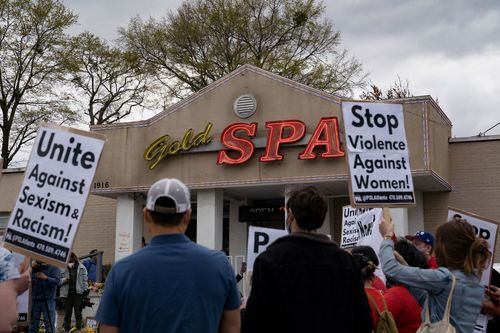Spa shootings could be first test of Georgia’s new hate crime law

The shooting spree across the Atlanta area last week that left eight people dead at three spas could be the first test of the hate crime law passed by the Georgia Legislature last year.
Robert Aaron Long was charged with murder in both Fulton and Cherokee counties in connection with the killings. Prosecutors don’t have to immediately notify the court if they’re going to seek enhanced penalties spelled out under Georgia’s new law, which was approved last summer and signed into law by Gov. Brian Kemp.
And while investigators haven’t offered a firm explanation for a motive behind the mass shootings, according to legal advocates, it’s plainly evident the shootings were motivated by race and gender, both categories for a hate crime under Georgia state law. Authorities said Long told investigators that the shootings were not racially motivated and told them he has a “sexual addiction.”
It’s also not clear whether federal prosecutors will bring charges. The standard to prove hate crimes in federal court is difficult because of the “but for” standard prosecutors use in weighing charges: that the alleged criminal would not have committed the crime “but for” the race, gender, or other identity of a victim protected by hate crime laws.
“Career prosecutors in the civil rights division and US Attorney’s Office thoroughly investigate matters that could meet federal hate crimes statutes. If the facts and law meet the elements of these statutes, the government may seek an indictment,” a Justice Department spokeswoman told CNN on Thursday.
“What can’t be forgotten is the hate crime statute says because of gender as well,” said Scott McCoy, the interim deputy legal director for LGBTQ rights and special litigation at the Southern Poverty Law Center. “The angle of misogyny has to be looked at as well, you know, did he kill them because they were women? That would be a hate crime because of their sex or their gender.”
“In this case, it’s not just their race or their national origin, there could be other things at play, and that requires some investigation and I hope law enforcement … look at this because violence against women is just as pernicious and dangerous as violence against race or against religion,” McCoy said.
Lack of jury trials may have slowed use of new law
Covid has slowed down the court system since last March, when the chief judge of the Georgia Supreme Court suspended jury trials due to the pandemic. The state’s chief justice announced last week that jury trials would restart again.
Peter Skandalakis, director of the Prosecuting Attorneys’ Council of Georgia, said he wasn’t aware of the law being used at all over the last year. His agency’s mission is to provide support to prosecutors.
Prosecutors in Fulton and Cherokee counties have not commented on whether they’ll seek enhanced penalties under the state’s recently enacted hate crimes law, which specifies enhanced penalties for crimes where victims were targeted for, among other things, race, gender, and sexual orientation.
Long was given a court-appointed attorney, J. Daran Burns, who issued a statement on Thursday saying, in part, “we are working on behalf of our client, Robert Aaron Long, to investigate the facts and circumstances surround this incident.”
Until last summer, Georgia was one four states without a law providing stricter sentencing guidelines for hate crimes. Arkansas, South Carolina and Wyoming do not have hate crime laws.
Long has been charged in the case but not yet indicted. Georgia’s law calls for a mandatory minimum of two years in prison for felonies charged as hate crimes, but because the underlying offense is murder, a guilty verdict won’t mean a longer sentence. The maximum sentence for murder in Georgia ranges from life in prison to death.
Georgia’s law does have other practical effects. It “allows for legal classification, which I think means a lot,” said Republican Rep. Chuck Efstration, the bill’s House sponsor. “It’s important that our laws speak to the true nature of offenses. Crimes of the same offense may not be similar, one (could be) particularly horrific because it’s a hate crime. We need our laws to reflect that difference.”
It also could have an effect on parole hearings, Efstration said.
The state had a hate crimes law on the books since 2000, though it was ruled unconstitutional in 2004 because it was “vague.” The Georgia House of Representatives passed hate crimes legislation in 2019, though the bill languished in the state Senate until the February 2020 death of 25-year-old Ahmaud Arbery.
Arbery was a Black man who was killed while jogging through a neighborhood near where he lived. Three White men were charged in connection to Arbery’s murder. The three men have pleaded not guilty.
“The General Assembly suspended for Covid in March of 2020. While we were in suspension, the national story about Ahmaud Arbery broke and brought renewed national attention on why we didn’t have a hate crime law,” Efstration said. “The Legislature resumed session in June and a lot of legislators who had said, maybe they weren’t so sure and didn’t understand why we needed it … but the Arbery case brought them around where they better understood the need.”
And though Georgia has had a hate crimes law in effect since last summer, it appears prosecutors haven’t had the occasion to seek stiffer penalties in any cases because of the lack of jury trials. And though the law requires local police agencies to report crimes to the state, it doesn’t require prosecutors to keep track of hate crime prosecutions.
The most common bias in reported hate crimes in Georgia is anti-Black, with 151 of 401 total incidents from 2019 to 2021 falling into that category, according to statistics released by the Georgia Bureau of Investigation (GBI). There were five reported anti-female bias incidents since 2019 — one in 2019, two in 2020 and two in 2021. No anti-Asian hate crimes were reported, which likely reflects an undercount and the hesitance to report crimes, according to advocates.
State tracks hate crimes but not prosecutions
The GBI, which tracks reported hate crimes to report them to the FBI through the uniform crime reporting system, doesn’t track prosecutions. Neither does the Georgia attorney general’s office or the Prosecuting Attorneys’ Council of Georgia.
“We must develop a method if we’re going to track it,” Skandalakis said. “Once a prosecutor decides to add the sentencing enhancement and if the jury returns a finding, we’ve got to be able to enter that into our crime information center so we can track it.”
Georgia’s law doesn’t give hate crimes their own charge, but rather allows prosecutors to classify existing charges as a hate crime before trial. Juries in these cases would first have to determine guilt, and then consider whether it’s a hate crime.
The standard for whether a state-level conviction would result in enhanced penalties is whether victims were “intentionally selected … because of such victim’s or group of victims’ actual or perceived race, color, religion, national origin, sex, sexual orientation, gender, mental disability, or physical disability.”
Nonetheless, legal advocates say that a more thorough investigation is needed by authorities to determine whether the 21-year-old admitted killer targeted people of Asian descent and women to lock in hate crime charges.
During a news conference on Wednesday, Cherokee County sheriff’s Capt. Jay Baker said that Long allegedly admitted to the shooting spree that left eight people dead, including six women of Asian descent. As to whether the incident could be classified a hate crime, Atlanta Police Chief Rodney Bryant said, “We’re still early in this investigation, so we cannot make that determination.”
Initially after the shooting, Justice Department officials, as did many in the public, believed that because most of the victims were of Asian ancestry the department would move to open a federal civil rights investigation.
A federal hate crime includes “acts of physical harm and specific criminal threats motivated by animus based on race, color, national origin, religion, gender, sexual orientation, gender identity, or disability,” according to the Justice Department.
Cherokee County Sheriff Frank Reynolds told reporters that Long said the shootings weren’t racially motivated and mentioned “potentially sexual addiction” as an indicator to why he targeted massage parlors, based on statements Long made to police. A White woman and a White man were also killed during the shooting spree.
“I certainly hope that law enforcement will do more than interview and take the word of the perpetrator as to whether or not something qualifies as a crime,” McCoy said.
‘There’s a lot more work to be done’
But for law enforcement to identify a hate crime, officers must understand what they are, treat them seriously and spend time as well as resources to investigate them, advocates say.
“There’s a lot more work to be done … We’re just not there as of yet,” Bryant said.
Miriam Krinsky, a former federal prosecutor and the founder of Fair and Just Prosecution, says that while the number of hate crimes reported have dramatically increased “more than 7,000 times” in 2019, it doesn’t “capture the full picture.”
“The numbers reported are likely a dramatic undercounting of what’s going on, you know. Data from the Bureau of Justice Statistics shows that fewer than 3% of bias victims even make a report,” Krinsky told CNN. “Often, individuals who’ve been victimized by bias or hate crimes are afraid to come forward because they simply don’t have trust in the system. They don’t trust police or the criminal legal system that has historically over-policed and not been sensitive to the needs of vulnerable communities that are most often victimized by hate crimes.”
Victims of crimes who identify with minority communities are often reluctant to report to the police because they are afraid of getting pulled into the immigration system if they are undocumented or getting accused of a crime themselves, McCoy said.
Krinsky says more needs to be done within the community to build trust rather than add statutes to enhance charges that already hold lengthy prison sentences.
McCoy says that listening and learning from victims of hate crimes is “hugely important” part of the training, and having a diverse staff is “vitally important” to “broaden the perspectives across law enforcement agencies.”
When hate crime enhancements are added to a charge it accurately legitimizes what type of crime occurred, puts the public on alert and it important to “call it out,” Krinsky said.
“It’s just as it’s important for these crimes to be reported to have data and be able to see where this is happening, what is the prevalence, has it increased or decreased, where is it being adequately enforced, where is it being underreported or simply not acknowledged for what it is,” Krinsky said.
“Those things matter, and they don’t alone address the issue, but they’re a starting point to knowing where we are going, and how are we doing, and what do we need to put in place to start to attend to these concerns. Unless we call the problem a problem, we’re not going to be willing to fix it.”



